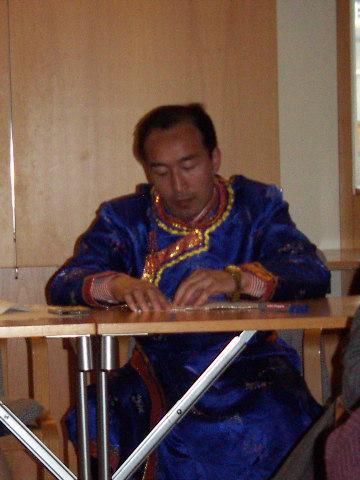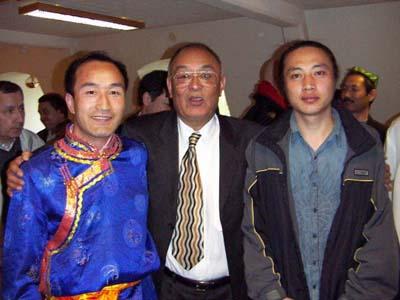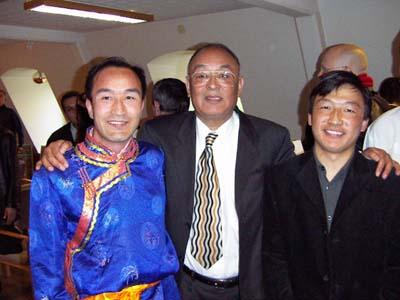| |
Northern European Branch
of Southern Mongolian
Human Rights Information
Center
Stockholm, Sweden
May 15,
2004
 On May 15, 2004,
dissidents from Eastern Turkistan, Inner Mongolia, and Tibet
held a conference called "The Uyghurs, Tibetans, and Mongols Are
Not Terrorists" in Stockholm City, Sweden. Mr. Norovzamsiin
Soyolt, an exiled dissident from Inner Mongolia, spoke at the
conference on the deteriorating human situation in Inner
Mongolia. The following is the original statement by Mr.
Norovzamsiin Soyolt to conference: On May 15, 2004,
dissidents from Eastern Turkistan, Inner Mongolia, and Tibet
held a conference called "The Uyghurs, Tibetans, and Mongols Are
Not Terrorists" in Stockholm City, Sweden. Mr. Norovzamsiin
Soyolt, an exiled dissident from Inner Mongolia, spoke at the
conference on the deteriorating human situation in Inner
Mongolia. The following is the original statement by Mr.
Norovzamsiin Soyolt to conference:
Statement by Norovzamsiin Soyolt,
an
exiled dissident from Inner Mongolia
May 15, 2004
Ladies and Gentlemen,
My name is Norovzamsiin Soyolt
and I am a native Mongol exiled from Inner Mongolia. I am
grateful to the Sweden Uyghur Committee for giving me the
opportunity to make this presentation about my homeland which is
still under the Chinese Communist Party’s brutal regime.
Inner Mongolia is home to 5
million indigenous Mongolian people and in 1947 the Chinese
Communist Party occupied the region against the wishes of the
Mongols. Over the past 57 years, the Chinese government policy
encouraging Han Chinese population transfer into the region has
turned the Mongols into a minority in their own lands and the
ratio of Han Chinese to Mongols today is 5:1. The pattern of
repression of the Mongols over this 57 year period has been
documented elsewhere so I will focus my comments on the current
human rights situation.
From many prominent human rights
violation cases in Inner Mongolia, here I would like to
introduce two specific cases. The first concerns Mr. Hada, an
ethnic Mongolian prisoner of conscience, and the second, the
ongoing forced eviction of Mongolian herdsmen from their
traditional pasturelands.
 Mr.
Hada who was born in eastern Inner Mongolia's Horchin Right Wing
Front Banner (banner is a geographical designation). In May
1992, Mr. Hada and other Mongolian students and intellectuals
established the Southern Mongolian Democratic Alliance (SMDA),
with Mr. Hada as President. The mission of this organization was
to promote and preserve Mongolian language, history and culture
and to peacefully find ways to obtain greater autonomous rights
for ethnic Mongols in the region as guaranteed by the Chinese
constitution. In December 1995, the authorities denounced the
Southern Mongolian Democratic Alliance as an illegal
organization "engaging in separatist activities" and arrested
Mr. Hada along with more than 70 members and demonstrators. In
December 1996, Mr. Hada was sentenced to 15 years jail for
"separating the country and engaging in espionage". The vice president of the SMDA, Mr. Tegexi, was sentenced to 10 years
jail for "conspiracy to subvert the government and separate the
country". Currently, Mr. Hada is serving
his sentence in Inner Mongolia Jail No.4 at Chifeng City. Hada's
wife, Ms Xinna, and young son Uiles have been subject to police
intimidation and allowed only limited visitation rights.
According to Ms Xinna, because of the hard labor and constant
torture by the police and inmates, Mr. Hada's health condition
is extremely poor. Ms. Xinna has also reported that Mr. Hada was
beaten by inmates with rubber clubs provided by prison guards
and on two occasions, a gun was held to his head by a prison
official who threatened to kill him. Equally disturbing, in June
2001, the "Mongolian Study Bookstore" owned by Ms. Xinna was
shut down and denounced as an "illegal business" by the
authorities. Mr. Hada's wife and young son have been denied the
right to pursue a livelihood. Mr. Tegexi
was released from the jail a year ago, but he is still under the
authorities’ close monitor and strict control. Mr.
Hada who was born in eastern Inner Mongolia's Horchin Right Wing
Front Banner (banner is a geographical designation). In May
1992, Mr. Hada and other Mongolian students and intellectuals
established the Southern Mongolian Democratic Alliance (SMDA),
with Mr. Hada as President. The mission of this organization was
to promote and preserve Mongolian language, history and culture
and to peacefully find ways to obtain greater autonomous rights
for ethnic Mongols in the region as guaranteed by the Chinese
constitution. In December 1995, the authorities denounced the
Southern Mongolian Democratic Alliance as an illegal
organization "engaging in separatist activities" and arrested
Mr. Hada along with more than 70 members and demonstrators. In
December 1996, Mr. Hada was sentenced to 15 years jail for
"separating the country and engaging in espionage". The vice president of the SMDA, Mr. Tegexi, was sentenced to 10 years
jail for "conspiracy to subvert the government and separate the
country". Currently, Mr. Hada is serving
his sentence in Inner Mongolia Jail No.4 at Chifeng City. Hada's
wife, Ms Xinna, and young son Uiles have been subject to police
intimidation and allowed only limited visitation rights.
According to Ms Xinna, because of the hard labor and constant
torture by the police and inmates, Mr. Hada's health condition
is extremely poor. Ms. Xinna has also reported that Mr. Hada was
beaten by inmates with rubber clubs provided by prison guards
and on two occasions, a gun was held to his head by a prison
official who threatened to kill him. Equally disturbing, in June
2001, the "Mongolian Study Bookstore" owned by Ms. Xinna was
shut down and denounced as an "illegal business" by the
authorities. Mr. Hada's wife and young son have been denied the
right to pursue a livelihood. Mr. Tegexi
was released from the jail a year ago, but he is still under the
authorities’ close monitor and strict control.
 The
second case concerns the Chinese government's on-going coercive
displacement of Mongolian herding populations. The Inner
Mongolian grasslands were considered to be one of the finest
natural grasslands in the world, perfectly suited for a herding
lifestyle. However, according to the Chinese official data, 81 %
of the territory of the Inner Mongolian Autonomous Region has
turned to desert and soil erosion areas. The officials do not
state that the desertification is primarily due to the intensive
over-cultivation of the grasslands by the millions of Han
Chinese farmers, as documented by scientific studies, but
instead have made the Mongol herders bear the brunt of the new
polices aimed to end the continuing desertifiation. The Chinese
Government has recently adopted a new policy targeting Mongolian
herding populations under the pretext of "giving rest to the
grassland and recovering the eco-system". This policy is called
"Environmental Immigration" (Sheng Tai Yi Min in Chinese) whose
aim is the forced eviction of the Mongolian herding populations
from their native lands to overwhelmingly Han Chinese populated
agricultural and urban areas. Over the past three years, at
least 160,000 ethnic Mongolians have been forcibly relocated
from their pasturelands. We see no mention of Han Chinese
farmers being relocated. Hundreds of thousands of Mongolian
herders have lost their homes, livestock and lands; Mongolian
traditional culture and lifestyle have forcefully been altered
and abolished; most of the Mongolian language teaching schools
in rural areas at elementary and middle levels have been removed
as the direct result of this policy. The
second case concerns the Chinese government's on-going coercive
displacement of Mongolian herding populations. The Inner
Mongolian grasslands were considered to be one of the finest
natural grasslands in the world, perfectly suited for a herding
lifestyle. However, according to the Chinese official data, 81 %
of the territory of the Inner Mongolian Autonomous Region has
turned to desert and soil erosion areas. The officials do not
state that the desertification is primarily due to the intensive
over-cultivation of the grasslands by the millions of Han
Chinese farmers, as documented by scientific studies, but
instead have made the Mongol herders bear the brunt of the new
polices aimed to end the continuing desertifiation. The Chinese
Government has recently adopted a new policy targeting Mongolian
herding populations under the pretext of "giving rest to the
grassland and recovering the eco-system". This policy is called
"Environmental Immigration" (Sheng Tai Yi Min in Chinese) whose
aim is the forced eviction of the Mongolian herding populations
from their native lands to overwhelmingly Han Chinese populated
agricultural and urban areas. Over the past three years, at
least 160,000 ethnic Mongolians have been forcibly relocated
from their pasturelands. We see no mention of Han Chinese
farmers being relocated. Hundreds of thousands of Mongolian
herders have lost their homes, livestock and lands; Mongolian
traditional culture and lifestyle have forcefully been altered
and abolished; most of the Mongolian language teaching schools
in rural areas at elementary and middle levels have been removed
as the direct result of this policy.
Dear friends,
today, Mongols who struggle to maintain and promote their
distinct culture continue to be subjected to harassment and
intimidation. Recent cases of individuals arrested for
distributing ‘separatist’ literature and another arrest for
merely wanting to celebrate Chinggis Khan’s birthday attest to
the continuing pattern of repression. In addition, since 1998,
at least 5 expatriate Inner Mongolians have been refused entry
into China and forced to return directly from the airports in
Beijing and Hong Kong, apparently for being associated in one
form or another with individuals the Chinese government has
blacklisted. We also know of 6 cases of expatriates (5 of them
are United States green card holders and 1 of them is even a US
citizen) being detained, questioned and monitored by the
authorities during their visit to Inner Mongolia. Recently, we
have obtained information regarding the cases of many ethnic
Mongolian students who currently study in Japan and have been
detained and brutally treated by the Chinese authorities during
their visits to Inner Mongolia for the suspicion of possible
contact with exiled organizations and individuals. The latest
case we know of concerns an ethnic Mongolian student who was
detained last month for two weeks during his home town visit
from Japan for organizing a peaceful gathering to protest
against a Hong Kong company’s illegal occupation of the local
Mongolian herders’ pastoral land.
Dear brothers and sisters, as
you know, since 1949, the Chinese Communist Party has kept one
of the worst human rights records in human history. After the
September 11, 2001, this brutal regime has accelerated its crack
down on all kind of peaceful movements by the ethnic minorities
especially our Uyghur friends under the excuse of “fighting
against terrorism”. In fact, the Chinese Communist Party is the
largest terrorist organization in the world because it is
abusing a quarter of the world’s population including the
Mongols, Uyghurs, and Tibetans.
Thank you!
Norovzamsiin Soyolt
|





